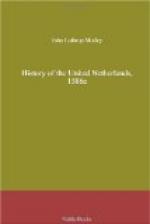The tragedy of Mary Stuart—a sad but inevitable portion of the vast drama in which the emancipation of England and Holland, and, through them, of half Christendom, was accomplished—approached its catastrophe; and Leicester could not restrain his anxiety for her immediate execution. He reminded Walsingham that the great seal had been put upon a warrant for her execution for a less crime seventeen years before, on the occasion of the Northumberland and Westmorland rebellion. “For who can warrant these villains from her,” he said, “if that person live, or shall live any time? God forbid! And be you all stout and resolute in this speedy execution, or be condemned of all the world for ever. It is most. certain, if you will have your Majesty safe, it must be done, for justice doth crave it beside policy.” His own personal safety was deeply compromised. “Your Lordship and I,” wrote Burghley, “were very great motes in the traitors’ eyes; for your Lordship there and I here should first, about one time, have been killed. Of your Lordship they thought rather of poisoning than slaying. After us two gone, they purposed her Majesty’s death.”
But on this great affair of state the Earl was not swayed by such personal considerations. He honestly thought—as did all the statesmen who governed England—that English liberty, the very existence of the English commonwealth, was impossible so long as Mary Stuart lived. Under these circumstances he was not impatient, for a time at least, to leave the Netherlands. His administration had not been very successful. He had been led away by his own vanity, and by the flattery of artful demagogues, but the immense obstacles with which he had to contend in the Queen’s wavering policy, and in the rivalry of both English and Dutch politicians have been amply exhibited. That he had been generous, courageous, and zealous, could not be denied; and, on the whole, he had accomplished as much in the field as could have been expected of him with such meagre forces, and so barren an exchequer.
It must be confessed, however, that his leaving the Netherlands at that moment was a most unfortunate step, both for his own reputation and for the security of the Provinces. Party-spirit was running high, and a political revolution was much to be dreaded in so grave a position of affairs, both in England and Holland. The arrangements—and particularly the secret arrangements which he made at his departure—were the most fatal measures of all; but these will be described in the following chapter.
On the 31st October; the Earl announced to the state-council his intention of returning to England, stating, as the cause of this sudden determination, that he had been summoned to attend the parliament then sitting in Westminster. Wilkes, who was of course present, having now succeeded Killigrew as one of the two English members, observed that “the States and council used but slender entreaty to his Excellency for his stay and countenance there among them, whereat his Excellency and we that were of the council for her Majesty did not a little marvel.”




